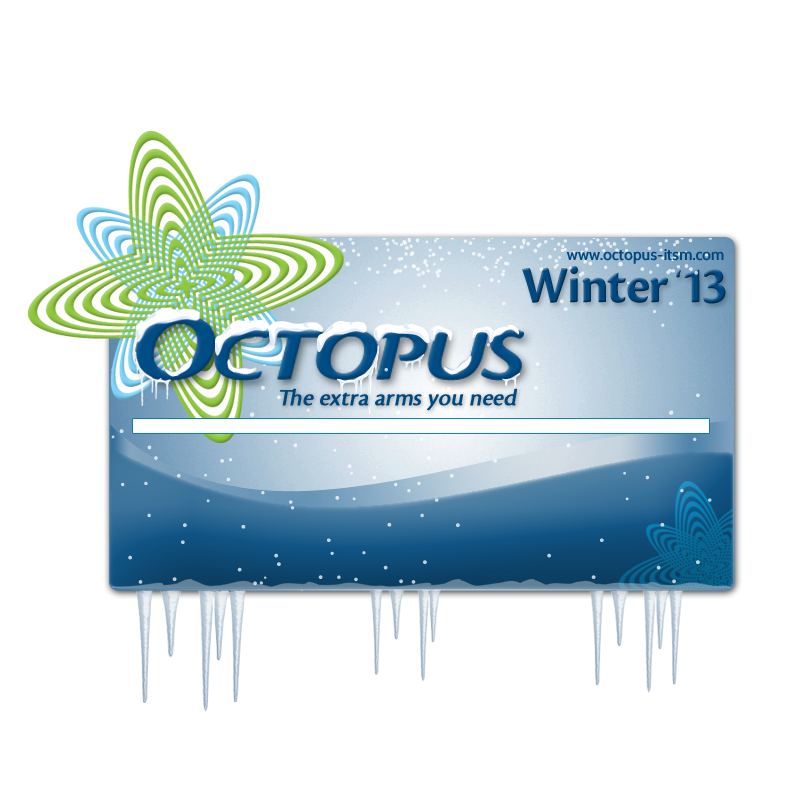
Welcome to the Octopus Winter 2013 version!
Winter '13 version has many interesting changes with the Web forms, but they do not have a major impact on the existing features. Therefore, its arrival will not require specific planning on your part.
Advanced Task Configuration
With the 2013 Winter version, we can now create SR types that will generate tasks only when certain fields are filled in the Web forms.
Essentially, you create the task by grouping the criteria that you want, and if at least one of the criteria is met, the task is generated. The criterion will be represented by a field from the Web form that has been transformed into a variable. Once this field gets filled out and the form is submitted, the corresponding task is generated and the task gets documented by the information entered by the requester.
It will be much easier to build this solution if you start by gathering the information in the Web form by sections. You can then group the criteria by section and create the tasks by sections as well. You create sections in the Web forms by using the "Header" type field. Then, it is easy to assign tasks to different groups or when required, to an external assignee group.
Below you see a scenario with the results. In this example, the Web form contains three (3) sections used to gather information for a move.
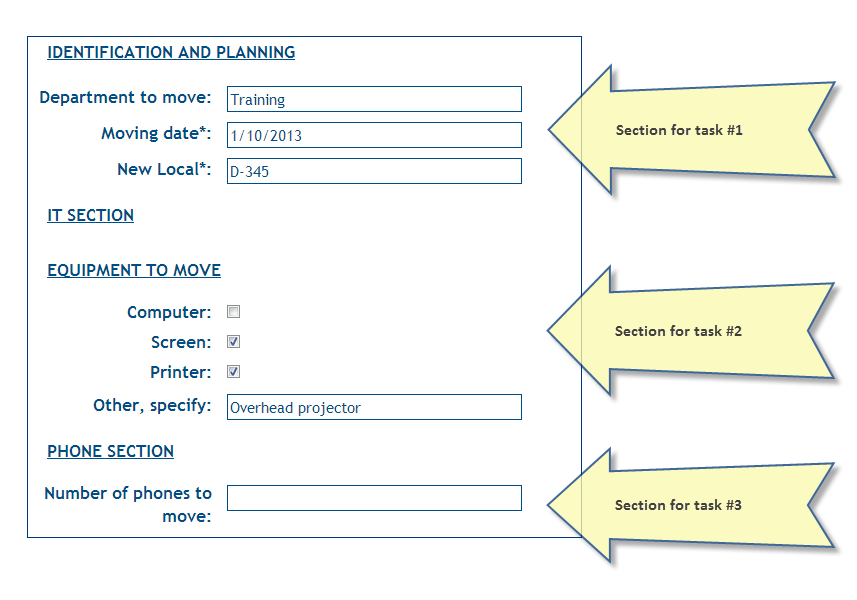
With the Advanced task configuration, when the criteria of a task are not filled, the corresponding task is simply not generated. Thus the SR will only contain tasks that are required based on the information filled in the Web form. In our example, the requester does not have a phone to move; this section of the form remains empty, and the "Phone section" task is not generated.

What makes the advanced configuration even better is that the information that was filled in by the requester can be used as instructions directly into a task.
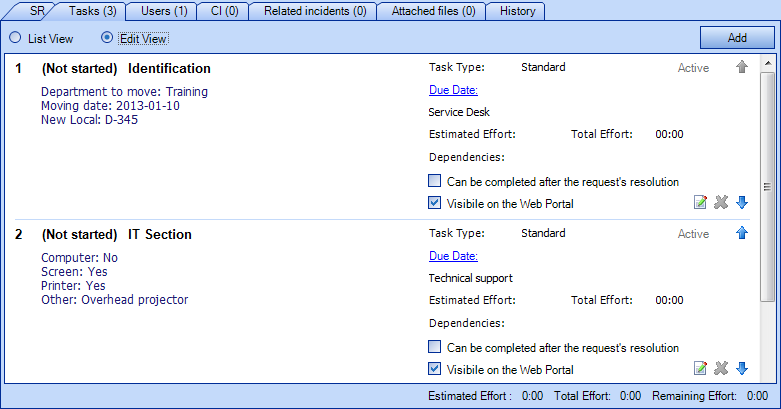
We have also added an option to personalize the subject of a task. This makes it easier for workgroups to use the information in the Octopus lists. See the example bellow:

This option opens a lot of possibilities, see the wiki article advanced task configuration for more details.
Alternate Subject
This option enables you to generate a request by using a subject different from the template. The alternate subject works with expressions from the Web form (personalized variables) or with Octopus variables using (F3).
You can see the results below. In our scenario, the Web form contains an alternate subject that uses Octopus variables to obtain the first and last name of the user as well as a personalized variable that enters the date of a move.

This is the result you get once the form is completed from the Web Portal when using an alternate subject:

Please read the Alternate Subject Wiki for a detailed description of this option.
Web Portal
Creating a New Request from an Old One
It is possible to create a Web request from a form that has been previously filled.
- The user selects the request that he wants to reuse, either from the Recent request list that contains the requests from the last 30 days or the History list that contains all the closed request of more than 30 days. Note that the History lets you do a search by number or by keyword.


- Click the button Copy this request at the bottom of the form to create a new request from this one.

- From there, modify the form with the new information and submit your request.
Improved Web Form Headers
The Web forms header format has been revised. Note that this improvement has also been applied to the WebTech interface.

Example:
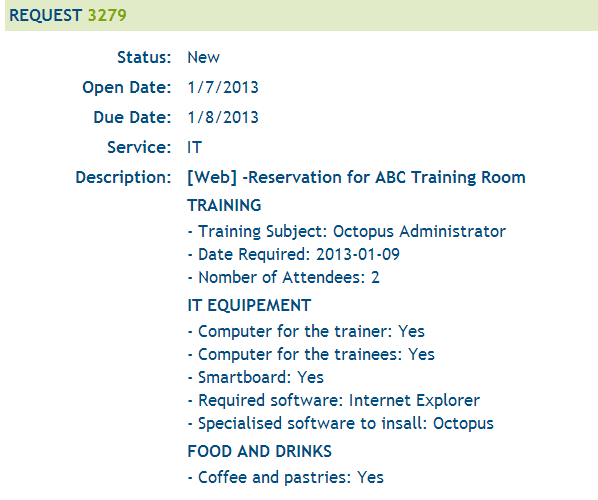
WebTech Interface
Added Template for Incident Creation
A "Template" field has been added to the creation of a new incident. This enables the possibility of using templates in incidents creation on the Web Portal, just as in the Octopus interface.
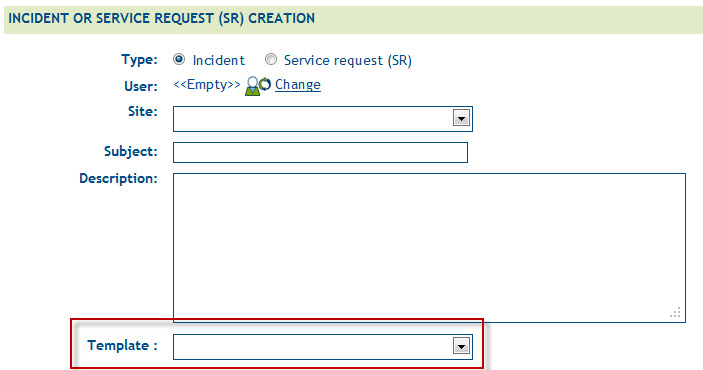
Modifiable Opening Dates
hen creating a request from the Web Portal, it is now possible to modify the open date. To use this option, you must first create the request and once it is saved, the Open Date field can be modified.
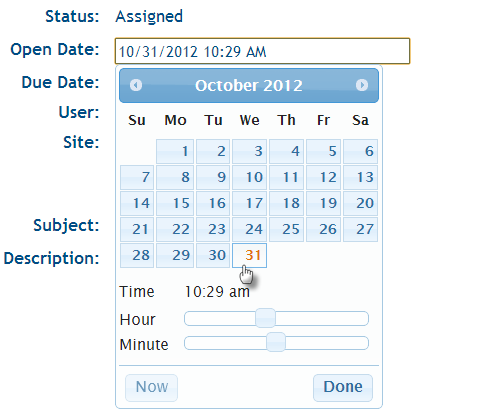
Improved Effort Entry
We have adjusted the way of entering an effort to facilitate the use for mobile devices.
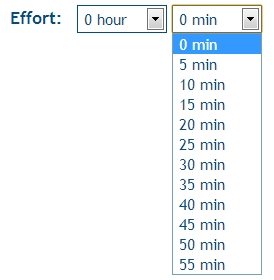
Request Suspension is Now Available
You can now mark requests as Suspended in WebTech.

Octopus Programs
ADSIReader - Options Added
- The option /IncludeDomainNameInWindowsUserName has been added. This option lets you import users with the same Windows username, but from different domains.
- You can now maintain user groups by synchronizing them with the ones from Active Directory. First you must:
- Create the group in Reference Data Management
- Select « Synchronize with this AD group »
- Add the AD group with the « Browse » button.

When the synchronization is done with ADSIReader, the users will be added or removed depending on the changes done in AD.
In the case where tasks were assigned to a user that has been removed, the system will automatically reassign the tasks to the user group from which they originated so they can get picked up by another user.
If you are already using ADSIReader,contact us to learn about the required modifications.
DataImporter - Additional Import Types
-
DataImporter can now import more data types, like:
-
CI types
-
Incident templates
-
SR types
-
Web forms
-
For more information on the subject, read the DataImporter wiki article
Other Improvements
- When adding an activity, the cursor now goes to the "Description" field instead of the "Date" one. However, if you have an "activity type" field, the cursor will position itself in it.
- The [Web] prefix present in the subject of requests created from the Web Portal can now be removed.

If you want to use this option, please contact us and make your request using the Web Portal.
- To help with the request management, the "Open Hour" column can now be added to a list.
- Improvement of MailIntegration errors: Octopus information is now more precise in the description of events when a MailIntegration error happens with an email message. For more information on the subject, please consult the New event notification section of the MailIntegration : Mail Integration with Incidents article.
- It is now possible to mark an incident as non significant for problem management or as a potential problem even when the incident is closed.

Thank you, your message has been sent.
